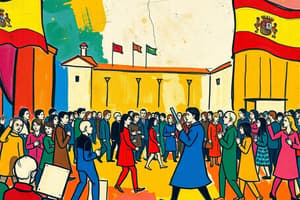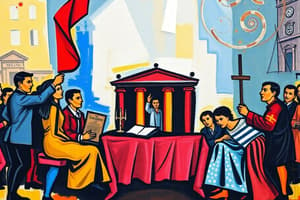Podcast
Questions and Answers
El papel del monarca es principalmente de carácter ceremonial y no tiene poder real.
El papel del monarca es principalmente de carácter ceremonial y no tiene poder real.
True (A)
La judicatura no tiene ninguna relevancia en la preservación del estado de derecho.
La judicatura no tiene ninguna relevancia en la preservación del estado de derecho.
False (B)
La constitución española es un pilar de la democracia y la sociedad en España.
La constitución española es un pilar de la democracia y la sociedad en España.
True (A)
Las comunidades autónomas en España no presentan ningún reto para la unidad del país.
Las comunidades autónomas en España no presentan ningún reto para la unidad del país.
La constitución no incluye mecanismos para adaptar los derechos fundamentales a los cambios sociales.
La constitución no incluye mecanismos para adaptar los derechos fundamentales a los cambios sociales.
La Constitución Española de 1978 marcó la transición de una dictadura a una república parlamentaria.
La Constitución Española de 1978 marcó la transición de una dictadura a una república parlamentaria.
La Constitución garantiza derechos fundamentales, incluyendo la libertad de expresión y el derecho a la educación.
La Constitución garantiza derechos fundamentales, incluyendo la libertad de expresión y el derecho a la educación.
La Constitución Española establece una clara separación de poderes entre los órganos legislativo, ejecutivo y judicial.
La Constitución Española establece una clara separación de poderes entre los órganos legislativo, ejecutivo y judicial.
La monarquía española, según la Constitución, es considerada como el cuerpo administrativo del gobierno.
La monarquía española, según la Constitución, es considerada como el cuerpo administrativo del gobierno.
Los derechos sociales, como el derecho a la vivienda, están protegidos y consagrados en la Constitución Española.
Los derechos sociales, como el derecho a la vivienda, están protegidos y consagrados en la Constitución Española.
Los mecanismos para enmendar la Constitución son flexibles y permiten cambios frecuentes.
Los mecanismos para enmendar la Constitución son flexibles y permiten cambios frecuentes.
La Constitución Española permite la creación de comunidades autónomas con responsabilidades compartidas.
La Constitución Española permite la creación de comunidades autónomas con responsabilidades compartidas.
La Constitución de 1978 ha permanecido inalterada desde su adopción.
La Constitución de 1978 ha permanecido inalterada desde su adopción.
Flashcards
El poder del monarca en España
El poder del monarca en España
El poder del rey está limitado por la constitución y está sujeto a la ley.
El papel del poder judicial en España
El papel del poder judicial en España
El poder judicial es independiente y se encarga de hacer cumplir la ley y proteger la constitución.
Importancia de la independencia judicial
Importancia de la independencia judicial
La constitución española establece la importancia de un poder judicial independiente para mantener la integridad del sistema legal.
Diversidad territorial en España
Diversidad territorial en España
Signup and view all the flashcards
Adaptarse a los cambios en España
Adaptarse a los cambios en España
Signup and view all the flashcards
La Transición Española
La Transición Española
Signup and view all the flashcards
Objetivos de la Constitución
Objetivos de la Constitución
Signup and view all the flashcards
España: Estado social y democrático de derecho
España: Estado social y democrático de derecho
Signup and view all the flashcards
Derechos y Libertades Fundamentales
Derechos y Libertades Fundamentales
Signup and view all the flashcards
Separación de Poderes
Separación de Poderes
Signup and view all the flashcards
Reparto de Poder: Gobierno Central y Comunidades Autónomas
Reparto de Poder: Gobierno Central y Comunidades Autónomas
Signup and view all the flashcards
Modificación de la Constitución
Modificación de la Constitución
Signup and view all the flashcards
Función del Monarca
Función del Monarca
Signup and view all the flashcards
Study Notes
Background and Historical Context
- The Spanish Constitution of 1978 marked a significant turning point, transitioning from a dictatorship to a constitutional monarchy.
- It followed the overthrow of General Franco's regime and a period of political instability.
- The constitution aimed to establish a democratic framework, outlining fundamental rights and freedoms, and providing a legal basis for Spain's future development.
- This era saw the emergence of new political parties and the adoption of modern democratic principles.
Structure and Principles
- The constitution establishes Spain as a social and democratic state of law.
- Spain is a constitutional monarchy with a parliamentary system of government.
- The constitution clearly defines the separation of powers among the legislative, executive, and judicial branches.
- It codifies fundamental rights and freedoms, ensuring protection for individuals against potential abuses of power.
- The principles of equality, justice, and solidarity form a central component.
Fundamental Rights and Freedoms
- The constitution guarantees a wide array of fundamental rights and freedoms, including those related to:
- Individual liberties (freedom of thought, conscience, expression, assembly).
- Political rights (the right to vote and be elected).
- Social rights (the right to education, housing, and healthcare).
- These rights are legally protected and enshrined in law.
- The constitution establishes mechanisms for protection and enforcement of these rights.
Division of Powers
- The constitution outlines the distribution of power between the central government and the autonomous communities within Spain.
- It creates a system of shared responsibilities and limitations.
- Each level of government has specific jurisdictions, such as tax collection, education, and healthcare.
Amendments and Evolution
- The Spanish Constitution incorporates mechanisms for its amendment, but these are stringent to protect its fundamental principles.
- The constitution has been amended a few times throughout the years, mostly in response to evolving societal needs and demands.
- These amendments demonstrate the constitution's capacity to adapt over time while retaining its core values.
Role of the Monarchy
- The constitution establishes the Spanish monarch as the head of state, embodying the unity of the nation.
- However, the monarch's role is largely ceremonial and representative.
- The King effectively acts as a figurehead of the state.
- The constitution firmly establishes that royal power is limited and subject to the law.
The Importance of the Judiciary
- The judiciary plays a crucial role in upholding the constitution and enforcing the rule of law.
- The courts are independent and adhere to principles of impartiality and legal scrutiny.
- The constitution reinforces the importance of an independent judiciary to maintain the integrity of the legal system.
Current Relevance and Challenges
- The constitution remains a cornerstone of Spanish democracy and society.
- Despite its strengths, challenges remain:
- Maintaining unity within a diverse country with various autonomous communities.
- Adapting to modern societal changes and new forms of political expression.
- Ensuring that fundamental rights and freedoms are protected for all individuals.
- Ongoing debate and scrutiny to ensure constitutional provisions are effective and meet societal expectations.
Studying That Suits You
Use AI to generate personalized quizzes and flashcards to suit your learning preferences.
Description
Este cuestionario explora la historia y los principios de la Constitución Española de 1978. Analiza la transición de la dictadura a la monarquía constitucional y destaca la importancia de los derechos y libertades fundamentales en la nueva estructura democrática. Una oportunidad excelente para profundizar en el contexto político y social de España durante este período crucial.




